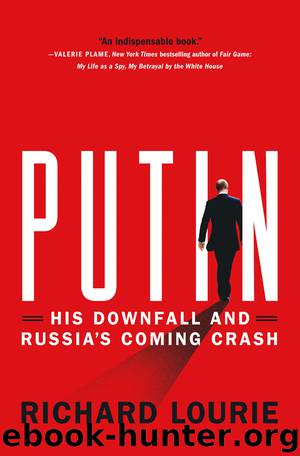Putin--His Downfall and Russia's Coming Crash by Richard Lourie

Author:Richard Lourie
Language: eng
Format: epub
Publisher: St. Martin's Press
PART FIVE
NORTH- AND EASTWARD
… With escalating terrorist threats at home, including in the Chinese heartland, and Uighur militants working with extremist groups like the Pakistani Taliban and the Islamic State, the imperative to stabilize China’s entire western periphery has increased.
—ANDREW SMALL
8
RUSSIA’S MECCA: THE ARCTIC
The Arctic has always been Russian. We will surrender it to no one.
—ARTUR CHILINGAROV
In late 2015 Dmitri Rogozin, deputy prime minister in charge of space and defense, tweeted the following: “The Arctic is Russia’s Mecca.” A flamboyant type, Rogozin has been known to say what others cannot or dare not. He first gained notoriety when he headed up the faux opposition party Rodina (Motherland), which produced a racist film spot, “Let’s Throw the Garbage out of Moscow,” showing dark-skinned men from the Caucasus leering at pure Russian women and littering the streets with watermelon rinds until a couple of real Russian men walk over to put things right. Rogozin was one of the first seven people to whom Obama’s sanctions were applied. His response: “Tanks don’t need visas.” He speaks four languages and has a Ph.D. in philosophy.
When it comes to the importance of the Arctic for Russia’s future Rogozin is hardly alone in voicing such maximalist sentiments. Addressing the next generation of Russians at a youth camp outside Moscow, Putin said of the country’s future: “Our interests are concentrated in the Arctic. And of course we should pay more attention to … strengthening our position [there].” When serving as president, Dmitri Medvedev frequently said that the Arctic must become a “main resource base” by 2020. The problem now is that after the break with the West over Crimea and Ukraine, the Arctic becomes both more essential to Russia’s future and, without Western investment, equipment, and expertise, much more difficult to exploit.
Calling the Arctic “Mecca” implies that the Arctic will save Russia not only economically, but spiritually as well. The identity that failed to crystallize in the decades after the fall of the USSR will finally coalesce around a great new national enterprise where heroic boldness, economic feats, and patriotism will merge. For grandeur and complexity the Arctic project is often compared to the mastery of outer space, and from the societal point of view, it has the advantage of allowing many more people to participate.
Russia made its Arctic intentions fully explicit on August 2, 2007, when Artur Chilingarov, scientist, polar explorer, and politician, startled the world by descending to a depth of some fourteen thousand feet in a submersible and planting a titanium Russian flag on the seafloor beneath the North Pole. His courage was admirable. Chilingarov was sixty-seven at the time. There was no guarantee that he would find his way safely back to the hole on the surface, and the submersible could not break through the ice on its own. In quite un-Soviet fashion, the entire proceedings were broadcast live.
Staking a claim by planting his nation’s flag like explorers of old elicited derision closely followed by alarm. “This isn’t the fifteenth century.… You can’t
Download
This site does not store any files on its server. We only index and link to content provided by other sites. Please contact the content providers to delete copyright contents if any and email us, we'll remove relevant links or contents immediately.
| Anthropology | Archaeology |
| Philosophy | Politics & Government |
| Social Sciences | Sociology |
| Women's Studies |
The Secret History by Donna Tartt(16684)
The Social Justice Warrior Handbook by Lisa De Pasquale(11499)
Thirteen Reasons Why by Jay Asher(7815)
This Is How You Lose Her by Junot Diaz(5809)
Weapons of Math Destruction by Cathy O'Neil(5062)
Zero to One by Peter Thiel(4841)
The Myth of the Strong Leader by Archie Brown(4798)
Promise Me, Dad by Joe Biden(4463)
Beartown by Fredrik Backman(4448)
How Democracies Die by Steven Levitsky & Daniel Ziblatt(4434)
Stone's Rules by Roger Stone(4427)
The Fire Next Time by James Baldwin(4357)
100 Deadly Skills by Clint Emerson(4095)
A Higher Loyalty: Truth, Lies, and Leadership by James Comey(4046)
Rise and Kill First by Ronen Bergman(4029)
The David Icke Guide to the Global Conspiracy (and how to end it) by David Icke(3900)
The Farm by Tom Rob Smith(3884)
Secrecy World by Jake Bernstein(3794)
The Doomsday Machine by Daniel Ellsberg(3743)
